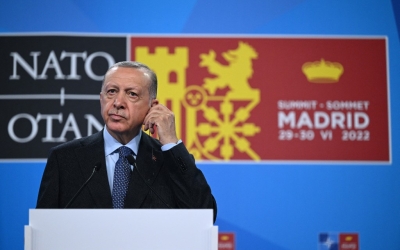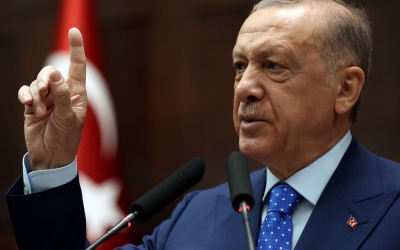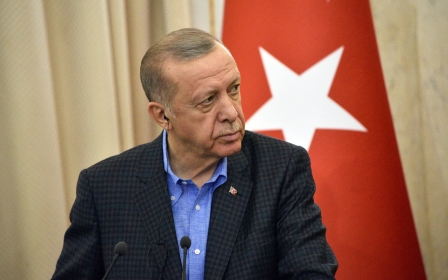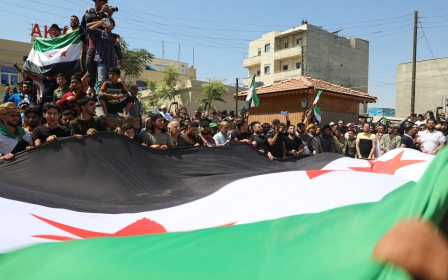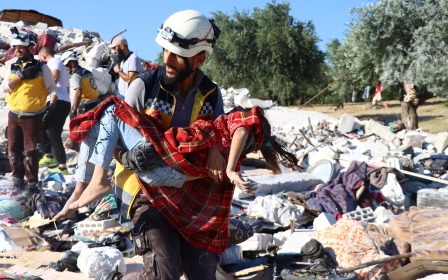Syria: Government shelling at market kills 15 civilians in Turkish-controlled area
At least 15 civilians have been killed, including five children, and 30 others wounded in government shelling that hit a busy market and other civilian buildings in the Turkish-controlled city of Al-Bab in northern Syria on Friday.
The rocket attacks came from areas under the control of government forces, the Syrian Democratic Forces (SDF) and pro-Iranian militias based east of Aleppo province, the Paris-based Syrian Network for Human Rights (SNHR) told Middle East Eye.
According to the Syria Civil Defence group, commonly known as the White Helmets, the number of casualties is likely to rise as rescue workers continue their search operations.
The attack came on Friday morning, an official holiday in Syria, when markets were bustling with customers ahead of the communal Friday prayer at noon.
“The attack was sudden. People were buying vegetables and breakfast,” Ibrahim al-Boushi, a survivor of the attack, told Middle East Eye.
New MEE newsletter: Jerusalem Dispatch
Sign up to get the latest insights and analysis on Israel-Palestine, alongside Turkey Unpacked and other MEE newsletters
“They can bomb the front lines, but instead they bomb the markets to terrorise civilians,” he added.
'We are just civilians, waiting for Friday to work. I sell vegetables, others sell bread, and yet they bombed us'
- Mahmoud Jubaili, Syrian vendor
Mahmoud Jubaili, a vendor who witnessed the shelling, told MEE that he and civil defence workers were pulling out body parts as they attempted to rescue the victims.
"We are just civilians, waiting for Friday to work. I sell vegetables, others sell bread, and yet they bombed us," said Jubaili. "Even when we work to support our family, they don't leave us. We are just civilians, we are not fighters, and we don't carry any weapons. Let us live in peace.”
Mahmoud Qitaz, another displaced Syrian who survived the attack, hit back at Turkish calls for reconciliation with the government of President Bashar al-Assad while the army continues to target civilians.
“The SDF and the Syrian regime forces are still bombing us continuously, yet there are calls for reconciliation with them. How can we forget the blood of innocents?” he said.
In a statement, the SDF denied having played any role in the Friday attack.
'It is a war crime'
Fadel Abdul Ghany, founder and head of the SNHR, told MEE that six missiles hit the area, landing in the crowded popular market, a civilian building and near a school.
"We condemn this indiscriminate attack and bombardment in the strongest terms, because it is a war crime, aims to terrorise civilians, and indicates the indifference to human rights and the rules of international law by the warring parties," Abdul Ghany said.
The attack on Friday came days after Turkish airstrikes killed 17 people at a military post located between Syrian government forces and the US-backed SDF near the Syrian-Turkish border.
The UK-based Syrian Observatory for Human Rights, which reported the raids on Tuesday, did not specify if the victims were affiliated with the government or Kurdish forces.
The Turkish strikes followed overnight clashes between Ankara's forces and the SDF west of Kobane, in which Kurdish forces struck inside Turkish territory, killing one soldier, according to Turkey's defence ministry.
If government forces are confirmed to be among those killed on Tuesday, the attack would mark one of the largest escalations since Ankara and Damascus traded attacks in 2020 following a Syrian government strike that killed 33 Turkish soldiers in the northwestern province of Idlib.
On Tuesday night, mosque loudspeakers in southern Turkey called on residents to stay inside their homes, claiming that a military operation in Syria had begun.
Turkish officials have been threatening for months to launch a new offensive in Syria, to capture the SDF-held towns of Tal Rifaat and Manbij in northern Aleppo province, whose towns are otherwise mostly held by Syrian government troops. However, Turkey’s interior minister denied that the military launched an assault on Tuesday and said an investigation would be opened into the mosques that claimed an operation was imminent.
On Wednesday, Imran Riza, United Nations Resident Coordinator and Humanitarian Coordinator in Syria, voiced his concern over the escalation of attacks after his recent visit to northeastern Syria.
“The RC/HC [Resident Coordinator and Humanitarian Coordinator] also expressed his alarm at the recent uptick in military action in the north, which has included drone strikes and shelling resulting in civilian casualties,” the UN said in a statement about Riza’s visit. “This has already led to heightened anxiety and some movements. Continued military action will lead to further major displacements.”
Fear of violations
Amid fears of more violence, Human Rights Watch (HRW) warned on Wednesday of the consequences that a new Turkish incursion in northern Syria would have on the population.
“Turkey and its allies have previously killed and arbitrarily arrested civilians following cross-border military operations in Syria that have resulted in massive displacement,” said Adam Coogle, deputy Middle East and North Africa director at HRW.
“Without taking adequate precautions, Turkish forces and their Syrian proxies risk repeating their abuses. The conflict could only worsen the already devastating humanitarian situation for millions of people in northern Syria.”
Turkish-backed forces have been accused of committing sexual violence against women and men in territories under their control, including at least 30 incidents of rape, according to the UN Commission of Inquiry on Syria.
The HRW added that Turkey and Turkish-backed factions have also failed in the past to ensure adequate water supplies to Kurdish-held areas in northeast Syria. About 460,000 people in these areas depend on water from the Allouk water station near the town of Ras al-Ayn (Serekaniye), the rights group added.
The Turkish operation, if launched, would be the fourth of its kind mounted by Ankara in northern Syria since 2016, with the aim of expelling Syrian Kurdish armed groups from areas near its southern border, as well as enabling the resettlement of internally displaced Syrians.
Middle East Eye delivers independent and unrivalled coverage and analysis of the Middle East, North Africa and beyond. To learn more about republishing this content and the associated fees, please fill out this form. More about MEE can be found here.


